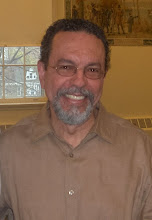I hate to start with a cliché but here it goes: “beauty is
in the eye of the beholder.” Right. And there is no beauty in being black if
the beholder is racist. There are no two ways about it: the idea that Ella Fitzgerald
was ugly, which is prominent in the musical play Ella, now playing at the Capital Rep in downtown Albany, starring
Tina Fabrique, can only be the product of the racist eye of the beholder who, recoiling
with prejudice at her sight, proclaimed that she was “the loveliest thing I
ever…heard.” Don’t get me wrong,
though. The play does not advance that
idea. It simply offers it as part of the historical record.
The statement about better heard
than seen is only one of many memorable lines in the play. I don’t know if
anyone actually said those words to Ella. But they are worth singling out
because they sum up the kind of racist put down that Ella Fitzgerald had to
endure throughout her life and career. She was
told that she was ugly, that were it not for her voice, she would have been
nothing; nothing to be, nothing to have, nothing to look at.
What nonsense! I have looked at plenty
of pictures of Ella and all I see is a beautiful woman who happened to be the
most celebrated jazz singer of the twentieth century. But I have it backwards:
she was the greatest female jazz singer of the twentieth century and she
happened to be beautiful. Fabrique’s rendition is done from the vantage point
of a physical resemblance to Ella. So, if Ella was ugly then Fabrique is ugly
and this is simply not the case. It takes some courage to play a role that
requires self-deprecation for being dark-skinned black with a flat nose and
flaring nostrils. But maybe it does not take much courage to do so, today. Times have changed. In that
sense, Fabrique has it easier than Ella did during her time. Fabrique reminds us that when Ella was coming along the
standard for physical beauty was, to put it mildly, different. If anything is
ugly, it is that period. The past
never dies and the play unwittingly reminds us of that. There are still plenty
of people around who would tell Ella, were she starting her career today, to
try radio.
Why are we so hung up on this subjective
thing called beauty when women are involved? Over the past six years I’ve
brought dozens of Latin jazz musicians to play in the Capital Region and
reviewers impressed with their musical virtuosity always add the adjective
“lovely,” only when the musician is female. The reviewers have always been male,
but I doubt that a female reviewer would write: “The piano player was in complete control of the 88s…and he was hot
too!” When was the last time a critic wrote or said: “Fulano is ugly as hell, but
he can really play!”? That Ella
Fitzgerald had to cope with the distorted mentality of Jim Crow America, to the
point of believing herself that she was no beauty, is disgraceful. No one
should be led to believe that they have succeeded in spite of themselves. Did
Ella succeed in spite of herself? What was her essence? Her body or her voice? Her
looks or her sound? I for one could not care less. History is what it is. Ella
was talented and beautiful. During her time, there were men who loved her, body
and soul. Were they blind?
They say that imitation is the
highest form of flattery. In Ella,
the flattery is obvious and the imitation impossible. Fabrique does not imitate
Ella; no one can re-create that unique voice. Fabrique sings with strength,
vitality, amazing range, a polished tone, and virtuosic ability that is all her
own. What happens is that we are reminded
that Ella existed, that she had the voice,
that she was fallible, that her beauty was not fully recognized. At the Capital Rep, Fabrique brings Ella’s
all-encompassing allure to life in a mix of words, gestures, movements, and
sounds that blows your mind.
In Ella, Tina Fabrique wins the audience over with her voice as well
as her presence. The play is a well-crafted exercise in historical synthesis. It
is an example of, I would say, covert pedagogy. We see the show not with the
intent to learn something but we do. We are there mostly to be entertained but we
are provoked to think about the circumstances of Ella’s career and life. The
thing is that learning and reflection creep up on you subliminally because, most
of all, we have fun.
The play is not entirely about
Ella. In a way, Ella is bait. You go in, and you are hooked. You know that
Fabrique is not Ella but you don’t mind because you are still getting a decent
glimpse of “Miss Fitz,” while enjoying Fabrique, a fantastic vocalist, backed
by a quartet of really sharp musicians with a lot of swing. In this play you
will hear great music and great songs. The Capital Rep theater is the perfect
setting: comfortable and intimate. The scenography is simple and elegant, the
engineering flawless. I anticipated that the air conditioning would be set at
full blast so I was prepared. When you go, make sure to wear long-sleeves and
you’ll be alright. Ella will make you
laugh and cry; it will move your body and your spirit and make you want to
dance. This is more than worth the price of admission.


